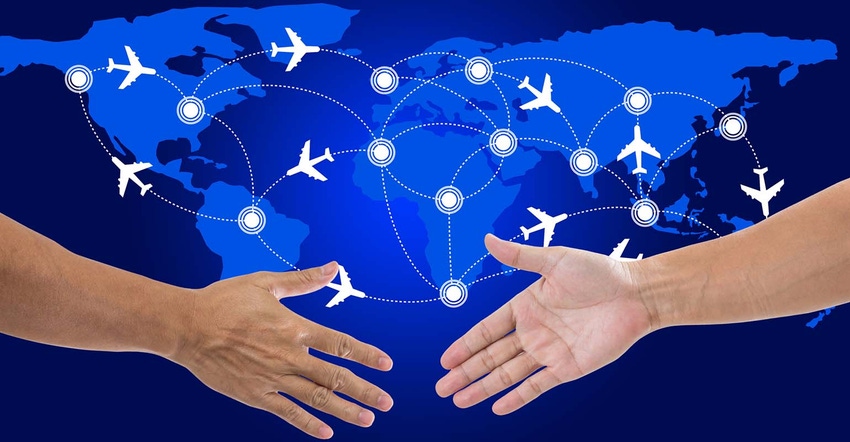
By Shawn Donnan
President Donald Trump’s relationship with European leaders has often been testy and the same applies to his aides. Then again, transatlantic relations have been rescued from the brink a number of times thanks to the personalities involved.
Which is why new European trade commissioner Phil Hogan’s visit to Washington this week is more important than most. Even if the big show while Hogan makes his first tour in his new post will be Wednesday’s signing of a long-awaited “phase one” deal between the U.S. and China.
When then-European Commission President Jean-Claude Juncker arrived in Washington in July 2018, many of those travelling with him were bracing for a turn to the worse in trade relations. Trump was threatening to impose tariffs on imported European cars and had become frustrated with Europe’s retaliation to steel tariffs he had rolled out.
Worried at what was unfolding, White House economic adviser Larry Kudlow reached out to Christine Lagarde, then the International Monetary Fund’s managing director, according to people familiar with the events. She suggested he get in touch with Martin Selmayr, Juncker’s top lieutenant. Within hours the two were huddled in the restaurant of the Hay Adams Hotel across from the White House, hashing out the terms of a tariff truce.
The mood between the two sides, however, remained tense. Until, that is, the next morning Juncker, a gregarious former prime minister of Luxembourg, marched into the Oval Office and planted a big kiss on the American president.
The atmosphere instantly lifted, according to people who were in the room. Within a few hours the two presidents were announcing what became known as the Rose Garden truce to a hastily called press conference even as some of their aides continued to stew.
Then again even a presidential peck has limited currency. The ceasefire has been fragile ever since, and the negotiations it triggered have gone nowhere. The EU is also back in the Trump tariff sights thanks to France’s introduction of a digital services tax. Transatlantic divisions over how to deal with Iran aren’t helping.
Enter Hogan. The politically savvy Irishman served as agriculture commissioner in the last European Commission and is no stranger to Washington. But Hogan has had a difficult start. He annoyed some in the White House and across 17th street at the U.S. Trade Representative’s office when in an interview soon after his appointment he told Irish radio that one of his goals would be “to get Mr Trump to see the error of his ways” on trade.
The interview was in line with what European officials say is their plan to take a more robust approach to dealing with Trump and his tariffs. But it so angered U.S. officials that Kudlow summoned the EU’s ambassador to Washington, Stavros Lambrinidis, to protest.
Hogan needs a reset. And for that he may also want to look up another trade negotiator in town this week: China’s Vice Premier Liu He. Liu has commanded the respect of his U.S. counterparts over three years of tough interactions, part of the reason he’s signing a deal at the White House on Wednesday morning. He may have some tips.
Charting the Trade War
Caution gripped the U.K. economy ahead of last month' s general election, fueling speculation the Bank of England is moving closer to cutting interest rates. GDP unexpectedly fell in November, leaving output just 0.6% higher than a year earlier — the worst performance in more than seven years.
Today’s Must Reads
Victory lap | After three years of tweets and tariffs, President Donald Trump has arrived at his China moment. Now the challenge turns to ensuring Beijing follows through.
No bull cause | Washington will likely take time to lift a ban on Brazilian fresh-beef imports amid frustration at the South American country’s decision to keep quotas on tariff-free imports of U.S. ethanol.
Chip shot | South Korea’s chip exports showed signs of revival after more than a yearlong slump, supporting optimism that the worst is behind for the trade-dependent economy.
Metal fatigue | A drop in American factory jobs shows Trump’s tariffs haven’t yet solved a key issue haunting U.S. steelmakers: China’s subsidizing of its own industry.
Over baht | Thailand’s Finance Minister Uttama Savanayana said any measures authorities take to curb gains in the currency won’t disrupt the “market mechanism” of the baht.
Economic Analysis
Risks in 2020 | Euro-Area GDP growth has slowed on global uncertainty tied to trade and Brexit.
Looking up | Singapore’s economy is poised for 2020 rebound after the trade hub suffered last year.
Coming Up
Jan. 14: China trade balance
Jan. 14-16: EU trade chief Phil Hogan plans trip to Washington
Jan. 15: U.S., China plan to sign phase-one deal in Washington
Jan. 21-24: Business and government leaders meet at the World Economic Forum’s annual meeting. Stay on top of all of the action via Bloomberg’s Davos Diary newsletter. Click here to subscribe.
--With assistance from Andrew Atkinson.
To contact the author of this story:
Shawn Donnan in Washington at [email protected]
To contact the editor responsible for this story:
Brendan Murray at [email protected]
Fergal O'Brien
© 2020 Bloomberg L.P.
About the Author(s)
You May Also Like




